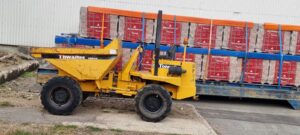In the realm of used plant machinery auctions, both novices and seasoned veterans can find themselves confounded by the myriad of industry-specific terms and jargon. Yet, understanding this unique language is crucial to a successful bidding experience. This article aims to demystify this jargon and provide a comprehensive glossary for beginners stepping into the exciting world of plant machinery auctions.
One useful resource to delve into this subject matter is www.ubidauctions.co.uk. This website not only provides a platform for auctions but also educates users about the process, including an understanding of the necessary jargon. Let’s examine some commonly used terms and phrases.
Absolute Auction (Unreserved Auction)
An absolute auction, also known as an unreserved auction, is an auction where the item for sale is sold to the highest bidder. There is no minimum price or reserve, meaning the item will be sold regardless of the highest bid made. In used plant machinery auctions, this can result in excellent deals if competition is low.
As Is, Where Is
This phrase is often used in used plant machinery auctions to indicate that the item is sold in its current condition and location. Buyers are expected to accept any flaws or issues with the item and are responsible for the transportation of the purchased item.
Buyer’s Premium
This is an additional fee charged by the auction house, calculated as a percentage of the winning bid and added to the final price. It’s important to factor in this cost when setting a budget for an auction.
Lot
In an auction, items are often grouped together for sale as a single entity, known as a lot. Lots can contain one or multiple pieces of machinery.
Provenance
Provenance refers to the ownership history of the item up for auction. In the context of used plant machinery auctions, provenance may include details about previous owners, usage history, maintenance records, etc.
Reserve Price
A reserve price is the minimum price that a seller is willing to accept for an item. If bidding doesn’t reach this price, the seller is not obligated to sell.
Sealed Bid
In a sealed bid auction, all bidders submit their bids privately to the auctioneer, and the highest bid wins. This process can be exciting and nerve-wracking as you won’t know your competitors’ bids. Visit harrismachinetools.com for more information and helpful resources on the topic. Happy bidding!
Sniping
Sniping refers to the practice of placing a bid at the very last moment of the auction to prevent other bidders from countering. While often used in online auctions, it’s also a common practice in live used plant machinery auctions.
Here are some other terms you might come across:
- Hammer Price: The price at which an item is sold when the auctioneer closes the bidding.
- Increment: The amount by which the auctioneer increases the bidding.
- Soft Close: In online auctions, if a bid is made in the last few minutes, the end time extends to allow other bidders to respond.
- Opening Bid: The first bid placed in an auction.
Understanding these terms is crucial for anyone planning to participate in used plant machinery auctions. Not only will it enhance your bidding experience, but it will also help you make more informed decisions, ensuring you don’t miss out on potential opportunities or get caught in bidding traps.
Remember, it’s not just about the highest bid but making the smartest bid. So equip yourself with the right knowledge, plan your bidding strategy and dive into the thrilling world of auctions.

